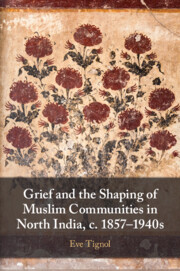Book contents
- Grief and the Shaping of Muslim Communities in north India, c. 1857–1940s
- Grief and the Shaping of Muslim Communities in north India, c. 1857–1940s
- Copyright page
- Contents
- Figures
- Acknowledgements
- Note on Transliteration
- Abbreviations
- Introduction
- 1 A Garden Lost
- 2 Useful Grief
- 3 Memorials, Feelings, and Public Recognition, c. 1911–1915
- 4 Empowering Grief
- 5 Nostalgia in Delhi
- Epilogue
- Glossary
- Bibliography
- Index
2 - Useful Grief
The Aligarh Movement
Published online by Cambridge University Press: 03 March 2023
- Grief and the Shaping of Muslim Communities in north India, c. 1857–1940s
- Grief and the Shaping of Muslim Communities in north India, c. 1857–1940s
- Copyright page
- Contents
- Figures
- Acknowledgements
- Note on Transliteration
- Abbreviations
- Introduction
- 1 A Garden Lost
- 2 Useful Grief
- 3 Memorials, Feelings, and Public Recognition, c. 1911–1915
- 4 Empowering Grief
- 5 Nostalgia in Delhi
- Epilogue
- Glossary
- Bibliography
- Index
Summary
This chapter examines the development of the āshob genre in the late 1870s and its contrasts with the post-1857 tradition. The context of the Russo-Turkish war prompted the circulation of shahr āshobs in the periodical press, which expanded to mourn worldwide ruin. Two distinct practices developed simultaneously: while the Awadh Punch built on the inherent plaintive dimension of grief to denounce oppression from the colonial state, Aligarh writers linked grief to regret to call their coreligionists to self-reformation. The emotional style of Altaf Husain Hali’s Musaddas (1879) and Shikwah-e Hind (1888), related to medieval Arabic elegies, became widely popular. The chapter shows how the Aligarh movement of Syed Ahmed Khan used it extensively to bolster elite community cohesion, especially during the anti-Congress campaign of 1888. Aligarh was then criticised for its manipulative recourse to emotion. The chapter highlights how Aligarhian discourses and practises were further criticised in light of the rise of early twentieth-century communal politics.
- Type
- Chapter
- Information
- Publisher: Cambridge University PressPrint publication year: 2023

